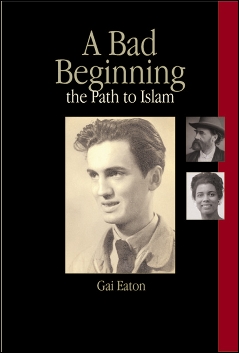Author: Charles Le Gai Eaton
What is an interesting fact about you many people may not know?
My illegitimacy (of which I was unaware till he age of 16) and the drama of secrecy surrounding my birth.
What was the last book you read? What drew you to it? What was your opinion about it?
“Dead Yard: Tales of Modern Jamaica”. My years in Jamaica shaped the course of my life and this is a masterpiece of reportage. The author went everywhere and met everyone.
What was the first book you ever read?
Probably Rider Haggard’s “She” or his novel “King Solomon’s Mine”
How do you choose what books to read? Do you read reviews or go by a friend’s word?
Reviews or notices of new books on the Sufi dimension of Islam.
Where do you do most of your book acquiring? Online? In stores? The Library?
Online.
What was the last book you purchased?
“Dead Yard” (see above) by Ian Thomson.
Please list your top three favorite books.
[Apart, of course, from the Quran]
“The Essential Writings of Frithjof Schuon” edited by Hossein Nasr.
“The Sufi Way of Knowledge” by William Chittick.
Almost any novel by Graham Greene.
Almost any of the sea novels of Patrick O’Brian.
Do you have any favorite movies?
Not really.
How long did you work on your current book?
About eight years on and off.
How did the idea for your book originate? Remember, the most incidental stories often make interesting publicity.
I have kept an intimate diary since I was a schoolboy aged 12. I always thought this would eventually provide the material for an autobiography.
Now, in old age, friends persuaded me that I should tell the story of an unusual and varied lifetime although concentrating on the first forty years.
What was the most difficult part of writing this book?
Keeping it within reasonable limits because the diary runs to millions of words so the great problem was what to leave out.
What was the easiest part of writing this book?
Re-reading old diaries, re-living the past and discovering all sorts of things about my past that I had forgotten.
What did you aspire to be when you were a child?
I wanted to follow in the footsteps of my grandfather, a popular and very successful novelist in the late nineteenth century. I also dreamed of being an explorer, particularly in Africa, because he had known most of the famous explorers of his time.
If you could meet one author, alive or deceased, who would it be? What questions would you ask them?
Possibly Marcel Proust. I would want to know how he transmuted his life experiences and emotions into fiction which, without being autobiographical, carried his unmistakable stamp. I wonder also how close his fictional characters were to the people assumed to have been his models.
All writers must deal with rejection. Do you have any tips for writers facing on onslaught of rejection?
The only answer is perseverance combined with a belief in the value of one’s own work. The temptation to give up can be almost irresistible. It is useful to bear in mind how many hugely successful books were at first rejected by publishers.
What is your favorite food?
White fish with creamed potatoes. My favourite food as a child and still so. Also French cheese (eg. Camembert) and Stilton.
What is your favorite thing to do when you are not writing?
Relaxing with my family, reading or watching television, either nature programmes or thrillers.
Can you tell me a little about what you are currently working on?
Trying to recast articles previously published and lectures given over a number of years in a fresh form and in the light of experience.
What made you decide to write professionally?
My grandfather’s example. He published over 60 novels and many stories in his lifetime
How were you “discovered”?
In the mid-1940s I wrote a number of “essays” on Eastern religions and on western writers such as Aldous Huxley influenced by them. One evening at a party I met a young woman who questioned me closely as to what I was writing. Finally she told me that she worked in the office of the poet T. S. Eliot who was then head of a major publishing firm (Faber & Faber) and asked me to send her the essays. She showed them to Eliot who summoned me to see him and suggested how this material could be put together. He published the resulting book, “The Richest Vein”, in 1949 when I was 28.


I have had the pleasure of reading Mr Gai Eaton’s previous works but had all but given up hope of a further volume, especially an autobiographical one such as this. Mr Eaton has an almost unique knack of making the most essential Islamic concepts easily understood in written English second to none, without any of the ‘dumbing down’ that one often finds so insulting nowadays in the field. As a British born Muslim I have found his work an inspiration and a reference, particularly as it was in a language and context that I and my peers could relate to intimately. Unlike many other authors, he is not afraid to use examples from his own life, which makes his work more accessible and interesting, as he does seem to have had a rather fascinating past. I am looking forward to this immensely!
This is now available to order from HUbooks
http://www.hubooks.com/Biography/Bad-Beginning-The-Path-To-Islam